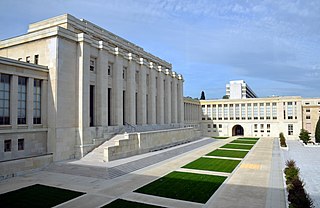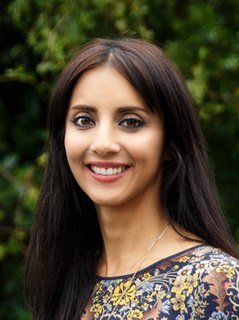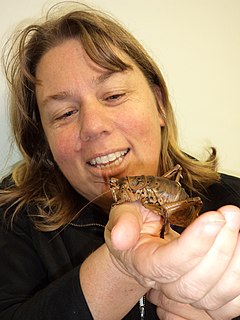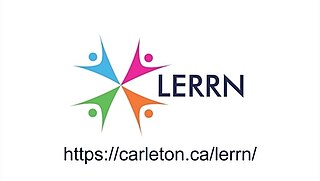Shaista Shameem, a Fijian lawyer, the director of the Fiji Human Rights Commission (FHRC) from 2002 to 2007, and its director and chairperson from 2007 to 2009. A graduate of the University of the South Pacific, she holds a PhD in Sociology from the University of Waikato and a Masters in Law from the University of Auckland. She also holds a Doctorate in Juridical Science.

An international organization is a stable set of norms and rules meant to govern the behavior of states and other actors in the international system. Organizations may be established by a treaty or be an instrument governed by international law and possessing its own legal personality, such as the United Nations, the World Health Organization and NATO. International organizations are composed of primarily member states, but may also include other entities, such as other international organizations. Additionally, entities may hold observer status.

Golriz Ghahraman is an Iranian-born New Zealand politician, member of Parliament, and author. The former United Nations lawyer was a child asylum seeker, and became the first refugee elected to New Zealand's Parliament. Ghahraman is a member of the New Zealand House of Representatives for the Green Party.

Wendy Larner is a New Zealand social scientist who has focussed on the interdisciplinary areas of globalisation, governance and gender. She is currently Provost at Victoria University, Wellington, New Zealand. In July 2018 she became the President of the Royal Society Te Apārangi, taking over from Richard Bedford.
Alison Cree is a New Zealand herpetologist. She is currently a professor at Otago University.
Marion Frances Robinson was a New Zealand nutritionist and physiologist. She was professor of nutrition at the University of Otago, and is particularly noted for her investigation of the importance of selenium in the human diet.

Viviane Marcelle Joan Robinson is an emeritus distinguished professor at the University of Auckland, specialising in organisational and educational psychology.
Anne Briar Smith was a New Zealand professor at the University of Otago, and was a pioneering children's rights researcher.

Nicola Jane Spurrier PSM is an Australian paediatrician and public health physician who has been the Chief Public Health Officer of South Australia since August 2019.
David R. Murdoch is a New Zealand academic specialising in paediatric infectious diseases, especially pneumonia. He has also worked on Legionnaires' disease and has advised the Oxford University vaccine group and the New Zealand government on COVID-19. Since February 2022, he has been Vice-Chancellor of the University of Otago.

Priscilla M. Wehi is a New Zealand ethnobiologist and conservation biologist. As at July 2021 she is an associate professor at the University of Otago and on the first of that month officially undertook the role of director of Te Pūnaha Matatini, a centre of research excellence in complex systems and data analytics. During the COVID-19 pandemic in New Zealand Te Pūnaha Matatini scientists have developed mathematical models of the spread of the virus across the country that influence the New Zealand government's response to the outbreak. In 2021 Wehi was awarded the Hill Tinsley Medal.
Claire Anderson is a British pharmacist who is a professor at the University of Nottingham. She investigates pharmacy practice research, and developed the first diploma in community pharmacy. In 2021 she was elected President of the Royal Pharmaceutical Society.
Maureen Baker is a Canadian–New Zealand sociologist and an emeritus professor of the University of Auckland. She has been a Fellow of the Royal Society Te Apārangi since 2009. Baker's work focused on children, families and gender.

George Ian TownFRACP is a New Zealand respiratory scientist and health official. He was appointed the Chief Science Advisor to the New Zealand Ministry of Health in 2019.
Jane McAdam or Jane Alexandra McAdam AO is an Australian legal scholar, and expert in climate change and refugees. She is a Scientia Professor at the University of NSW, and is the inaugural Director of the Kaldor Centre for International Refugee Law. She is a Fellow of the Academy of Social Sciences. She was awarded an Order of Australia in 2021 for “distinguished service to international refugee law, particularly to climate change”.

The Global Refugee-Led Network (GRN), previously known as the Network for Refugee Voices, is an international not for profit organization that organizes advocacy between local and national refugee organizations.
Alexander M. Gillespie is Pro Vice-Chancellor for Research and Professor of Law at the University of Waikato specialising in international law related to war, the environment and civil liberties. He has served on international delegations including UNESCO, advised the New Zealand government on social issues and made a number of appearances before the Waitangi Tribunal. Gillespie frequently takes public positions on global conflict, climate change, refugees and environmental issues in the New Zealand media and has published seventeen books. He has won international and New Zealand awards in recognition of his understanding of how international law impacts society.

The Local Engagement Refugee Research Network (LERRN) is a group of researchers who work on the inclusion of refugees in public policy. The group is hosted by Carlton University in Canada.
Marko Milanović is an international law scholar who works at the University of Nottingham School of Law as Professor of Public International Law and is an editor of the European Journal of International Law and its blog, EJIL: Talk!.
Discrimination based on nationality is discriminating against a person based on their nationality, country of citizenship, or national origin. Although many countries' non-discrimination laws contain exceptions for nationality and immigration status, nationality is related to race and religion, so direct discrimination on the basis of nationality may be indirect discrimination on racial or religious grounds. Discrimination "against any particular nationality" is prohibited by the International Convention on the Elimination of All Forms of Racial Discrimination (CERD).








